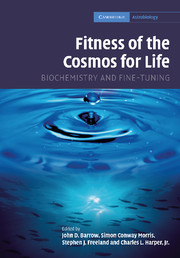Book contents
- Frontmatter
- Contents
- List of contributors
- Foreword: The improbability of life
- Preface
- Acknowledgments
- Part I The fitness of “fitness”: Henderson in context
- Part II The fitness of the cosmic environment
- 6 Fitness and the cosmic environment
- 7 The interconnections between cosmology and life
- 8 Chemistry and sensitivity
- 9 Fitness of the cosmos for the origin and evolution of life: from biochemical fine-tuning to the Anthropic Principle
- Part III The fitness of the terrestrial environment
- Part IV The fitness of the chemical environment
- Index
- References
9 - Fitness of the cosmos for the origin and evolution of life: from biochemical fine-tuning to the Anthropic Principle
Published online by Cambridge University Press: 18 December 2009
- Frontmatter
- Contents
- List of contributors
- Foreword: The improbability of life
- Preface
- Acknowledgments
- Part I The fitness of “fitness”: Henderson in context
- Part II The fitness of the cosmic environment
- 6 Fitness and the cosmic environment
- 7 The interconnections between cosmology and life
- 8 Chemistry and sensitivity
- 9 Fitness of the cosmos for the origin and evolution of life: from biochemical fine-tuning to the Anthropic Principle
- Part III The fitness of the terrestrial environment
- Part IV The fitness of the chemical environment
- Index
- References
Summary
The boundaries of philosophy, science, and theology
Some of the deeper questions that humans have raised are not always answerable within the boundaries of science. Instead, philosophers and theologians have approached such questions within their own domains of competence. One such example is provided by the question of purpose in evolution (see the discussion below). Indeed, the concept of purpose in a general sense may be understood as something that one sets before oneself as an object to be attained, an aim to be kept, a plan to be formulated. In attempting to give an answer to the question of “purpose in nature,” we should discuss the main components of human knowledge in an integrated way, so as to ask the right questions in the right field of knowledge. This approach should encourage us to provide appropriate answers that are reasonable within philosophy, science, or theology. At this juncture, it may also be argued that the task of a scientist should be independent of those of the other areas of human culture (Russell, 1991, p. 13). On the other hand, it is surely useful to be aware that this view of the role of science that is “divorced” from both philosophy and natural theology can also be seen from a different point of view (Townes, 1995, p. 166): because science and religion are evolving and are similar in their search for truth, convergence of these independent searches for truth may occur in the future.
- Type
- Chapter
- Information
- Fitness of the Cosmos for LifeBiochemistry and Fine-Tuning, pp. 151 - 166Publisher: Cambridge University PressPrint publication year: 2007
References
- 2
- Cited by

